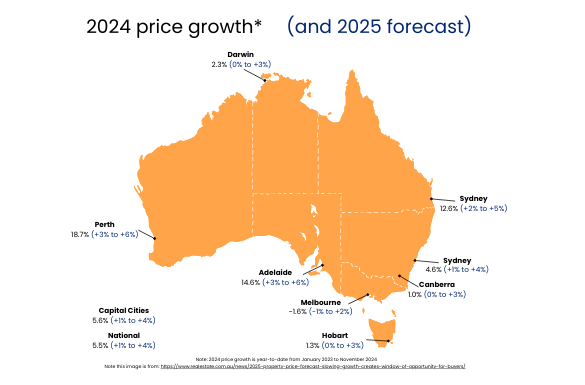The landscape of finance in Australia has always been dynamic, but 2025 is shaping up to be a particularly transformative year for business owners. From the Reserve Bank of Australia’s (RBA) latest rate moves to a looming federal election and rising global trade tensions reignited by Donald Trump, the stakes for Australian businesses have rarely been higher.
The Current State of Business Lending
As of early 2025, business lending in Australia is seeing a resurgence. The RBA’s latest data shows business credit growth at 8.9%, the fastest since mid-2023, driven by increased activity in construction, renewable energy, and transport sectors. Investor housing lending is also on the rise, which is creating a flow-on effect in commercial lending needs as businesses expand to service growing housing demand.
This lending surge is being powered by both traditional banks and a rapidly growing private lending sector, which is bridging the gap where banks remain cautious. Private lenders, offering returns north of 10% to investors, are increasingly stepping in where major banks hesitate—especially for asset-backed and cash-flow-based loans(brokernews.com.au)(https://www.brokernews.com.au/news/breaking-news/2025-sees-surge-in-business-and-home-lending-rba-reports-286490.aspx).
Interest Rates: Where Are We Now?
Following a year of stability, the RBA finally moved in February 2025, cutting the cash rate from 4.35% to 4.10%. This decision came on the back of easing inflation (down to 3.2% in the December 2024 quarter) and signs of slowing consumer spending and a cooling labour market (https://www.renownlending.com/blog/rba-rate-cut-what-it-means-for-borrowers-businesses-and-private-lending-in-2025).
Despite the February cut, the RBA held rates steady in April, preferring to wait for the late-April CPI update before making another move. Some experts, like Peter Boehm, believe the previous cut was premature, especially given continued inflationary pressures driven by global uncertainties—including the impact of recent tariffs imposed by Donald Trump (https://www.finder.com.au/rba-cash-rate).
Rate Forecasts: What Do the Banks Think?
Here’s where Australia’s four major banks forecast the cash rate by the end of 2025:
- CBA: Predicts two more cuts, ending 2025 at 3.60%.
- Westpac: Forecasts the rate at 3.35% with three more cuts.
- NAB: Sees rates at 3.10%.
- ANZ: Recently adjusted their forecast, now predicting three more cuts, and hasn’t ruled out a larger 50 basis point cut if global economic sentiment deteriorates (https://www.canstar.com.au/home-loans/interest-rate-forecast-australia/).
This sets a cautiously optimistic tone for business borrowers, particularly those looking to refinance or secure capital for growth.
Trump’s Trade War Reloaded: A Global Risk Factor
The global economic balance has tilted once again with Donald Trump’s re-election and the reintroduction of aggressive tariff policies, particularly targeting China and strategic trading partners. While Australia has not been a direct target, the ripple effects are real.
Global trade tensions raise the cost of imports and may push up inflation—especially on essential goods and raw materials. The RBA has acknowledged that it is closely watching these developments and is “well placed” to respond if such external shocks disrupt domestic economic activity(canstar.com.au)om.au](https://www.canstar.com.au/home-loans/interest-rate-forecast-australia/)).
Historically, global trade disputes—like Trump’s 2018-2019 tariffs—have caused uncertainty, weakened investment confidence, and required monetary policy responses. Should inflation spike due to tariffs, rate cuts might be off the table, and business borrowers could face tighter conditions once again.
Australia’s Federal Election: What’s at Stake for Businesses?
Australia’s federal election is just around the corner. Whether the Labor government retains power or a Liberal-led coalition takes over will significantly influence fiscal policy and potentially interest rates.
Labor’s Business-Related Policies:
- National Reconstruction Fund – Supporting advanced manufacturing and renewable industries.
- Small Business Energy Incentives – Tax breaks for upgrading to energy-efficient assets.
- Government-backed finance for startups – Through agencies like the CEFC and EFA.
Labor aims to maintain a high-investment environment, which may be mildly inflationary and could influence the RBA to delay further cuts.
Liberal/National Coalition Priorities:
- Company Tax Incentives – Expanded instant asset write-off and lower small business tax rates.
- Industrial Relations Reform – Easing award compliance and simplifying enterprise bargaining.
- Budget Repair Focus – Reducing government spending to ease inflationary pressures.
A Liberal win would likely shift fiscal policy toward austerity, potentially supporting the RBA’s rate-cutting path more aggressively.
Inflation: What’s the Trend?
The most recent inflation reading—the December 2024 quarter—showed CPI at 3.2%, inching closer to the RBA’s 2–3% target. Trimmed mean inflation (the RBA’s preferred measure) is at its lowest level since 2021, indicating strong disinflation momentum(renownlending.com)ding.com](https://www.renownlending.com/blog/rba-rate-cut-what-it-means-for-borrowers-businesses-and-private-lending-in-2025)).
Experts forecast further easing if wage pressures remain in check and consumer demand continues to soften. This trend supports more rate cuts in the second half of 2025.
Opportunities for Business Owners
With interest rates expected to fall, the current window presents a prime opportunity for businesses to secure funding before further economic shifts or election-induced volatility.
Whether it’s:
- Securing long-term fixed rate loans before rates dip further
- Refinancing existing high-rate debt
- Financing an expansion or acquisition
- Tapping into private lending to overcome bank hesitancy
…now is the time to act.
Private lenders are also stepping up, offering flexible, asset-backed loans, fast approvals, and bespoke lending solutions for business owners who don’t fit traditional credit boxes.
Why You Should Work With a Business Loan Broker
As lending conditions shift, navigating your options becomes increasingly complex. Here’s why a specialist business loan broker is invaluable in 2025:
1. Access to a Broad Range of Lenders
From big banks to niche private lenders, brokers can access dozens of options, finding tailored solutions whether you need:
- Working capital
- Equipment finance
- Invoice factoring
- Property development loans
- Unsecured business loans
2. Navigating Policy Complexity
With election uncertainty, shifting inflation trends, and tightening lending rules, brokers stay ahead of policy changes so you don’t have to.
3. Negotiation Power
Brokers understand the market inside-out and can negotiate terms that you likely couldn’t get on your own—including better interest rates, lower fees, and more flexible loan covenants.
4. Strategy-Driven Advice
Good brokers don’t just secure loans—they provide financial strategy. That might mean advising on loan structure, risk mitigation, or even using SMSFs or trusts for asset protection.
Final Thoughts: Act Now, Before the Window Closes
The rest of 2025 promises both opportunity and volatility for business owners. Falling rates, private credit availability, and strategic government incentives all offer growth potential—but only if businesses act decisively.
As economic and political forces realign—from Trump’s tariff playbook to Australia’s looming election—the lending landscape could tighten unexpectedly. That’s why it’s crucial to partner with a trusted business loan broker who can help you secure the right finance now, while conditions are still favourable.
We often speak with businesses who are thinking of refinancing to get access to more capital, or getting a brand new loan facility, and they sometimes want to “wait and see”. And after a few months, they come back to us needing the new capital, only to find their options have deteriorated because the financials of their business have also declined. This is why we encourage businesses to apply for loans when their businesses are healthy, as they can often get very good terms from banks/lenders.
Waiting until the business desperately needs the cash often leads to scenarios where the business either can not get the funds or the terms are not as favourable. It is always best to be pre-emptive.
Need help navigating your business finance options?
Let a specialist loan broker help you find the best loan from dozens of lenders—traditional and private—to grow, protect, or refinance your business in 2025. Don’t wait for more uncertainty. Reach out today at 1300 373 300 or [email protected]. Visit our Resources & Learning page for more insights..



